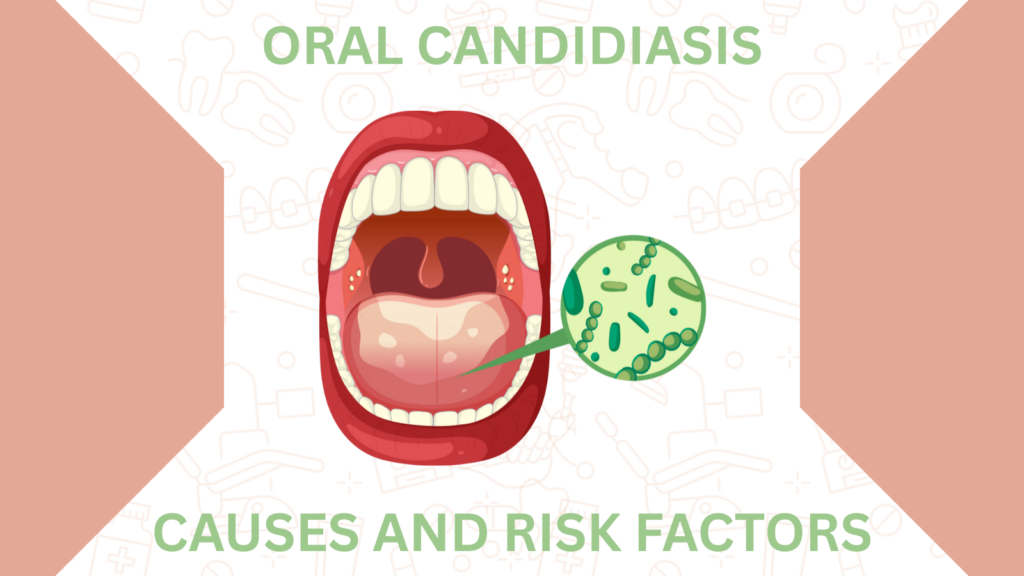
1. Introduction
What is Oral Candidiasis?
Hey there! Let’s talk about something that may not be the most pleasant of topics, but it is knowing about it in case you are ever faced with it: oral candidiasis. You may have known it as “thrush.” It’s essentially when a yeast called Candida throws a party in your mouth. Not fun, right?
Summary of Oral Thrush (Candidiasis of the Mouth)
Oral thrush is that unwanted guest that will make everyone in the room feel awkward. And it can hit anyone, from newborns to grandparents. Indigestion itself isn’t usually a cause for concern — but it can be a symptom of an underlying condition, though, in which case you should call your doctor. (More on that later.) It’s always disappointing to hear, “You are what you eat” and it turns out, I know what you mean too.
2. Causes and Risk Factors
How Do Your Get Oral Candidiasis?
I mean, we all have little organisms running around inside us. Well, Candida is one of them. For the most part it keeps to itself, but every now and then it gets a little too carried away and it overgrows. That, of course, is when the trouble starts.
What Is the Most Likely Cause of Oral Candidiasis?
That troublemaker is most often a yeast called Candida albicans. It’s kind of like that one friend who’s O.K. for short bursts of time, but if he sticks around too long starts to grate on you.
Oral Thrush Causes
There are a couple of things that can roll out the red carpet for thrush:
- Use of antibiotics (they destroy the good bacteria that allows Candida to overgrow)
- Having an impaired immune system
- Inhaled corticosteroids use
- Dentures — particularly if they don’t fit properly
Risk Factors
Not everyone has the same risk of getting thrush, though:
- People with diabetes
* People receiving chemotherapy - Folks with HIV/AIDS
- Smokers
- Babies and older adults
3. Symptoms and Appearance
Oral Candidiasis Symptoms
If you have thrush you might have:
- A cotton-like sensation in the mouth
- Loss of taste
- Redness or tenderness within your mouth
- Difficulty swallowing
What Is Oral Candidiasis?
White Patches in Mouth
Thrush often appears as small white patches on your tongue or inner cheeks. It’s sort of feels like someone knocked over a pot of cottage cheese in your mouth (yuck I know, but that’s what it looks like!).
Thrush on Tongue
When thrush takes over your tongue, it could be due to an underlying issue. It can also give your tongue a whitish appearance and appear like little bumps on the surface of the tongue, resembling a white fuzzy blanket.
Can You Scrape Oral Candidiasis Off?
Here is a little test: if you scrape those white patches, and they come off, leaving red, irritated skin below, it’s a good sign that you may have thrush. But maybe, just don’t go scraping your mouth, okay? Let the pros worry about all that!
4. Diagnosis
Clinical Examination
If you suspect you have thrush, your dentist or doctor will examine your mouth. They’re sleuthing around, searching for traces!
### Utilization of Oral Candidiasis Pictures
Hayes are somewhat “having to make do with what you have,” and may compare what you see to some images of yeast to help make a diagnosis.
Confirming Diagnosis
If they’re uncertain, they may take a sample of your mouth to look at under a microscope, or send it to a lab to be tested. It’s CSI for your mouth!
5. Types and Demographics
Neonatal Oral Candidiasis | Oral Candidiasis in the Newborn interstitial pneumonia.
Babies experience thrush as well, frequently acquiring a case due to passage through a birth canal. It’s actually pretty normal and usually not a big deal.
Oral Candidiasis in Adults vs. Infants
Babies are exposed to thrush in utero and via breast-feeding, but adults typically develop thrush when their immune system is compromised or when they are undergoing a course of antibiotics.
6. Treatment
Treatment of Oral Candidiasis
There are a several different ways to kick thrush to the curb:
- An antifungal medicine (such as nystatin or fluconazole)
- Good oral hygiene
- Changes in diet (reduced sugar and yeast)
There are also certain over-the-counter remedies that you can also try:
- Antifungal lozenges
- Saltwater rinses
- Probiotic supplements
Duration of Oral Candidiasis
Thrush generally clears up with treatment within a week or two. If it endures, by all means get in touch with your physician again.
7. Prevention
How to Avoid Oral Candidiasis
So, you know, an ounce of prevention is worth a pound of cure. Here are some tips:
- Practice good oral hygiene
- Gargle and rinse your mouth with water after a corticosteroid inhaler
- Control comorbidities such as diabetes
- Giving up smoking (easier said than done!)
Prevention for High-Risk Groups
If you wear dentures, clean them often and remove them at night. Sterilize bottles and pacifiers frequently if you have a baby.
8. Contagiousness and the Public Interests
Is Oral Thrush Transmittable?
Is Thrush of the Mouth Contagious?
Good news! Healthy adults are not normally contagious for thrush. But if your immune system is compromised, you may want to err on the side of caution.
9. Conclusion
Summary of Key Points
And of course keep in mind that thrush is common, and in most cases, not serious. It can be uncomfortable, but treatable. Practice excellent oral hygiene and before you know it, you’ll be all smiles!
When to See a Doctor
If that package doesn’t do the trick, or if it’s been a week or two and your symptoms aren’t improving, or you’re having trouble swallowing, it’s time to give your doctor a call. They’re there to assist, so don’t hesitate!








